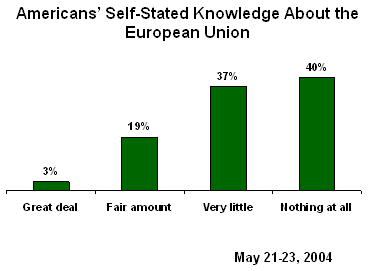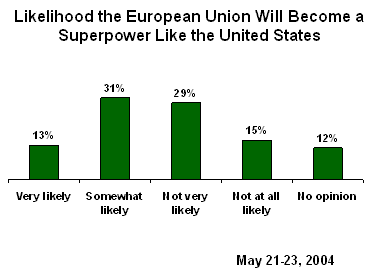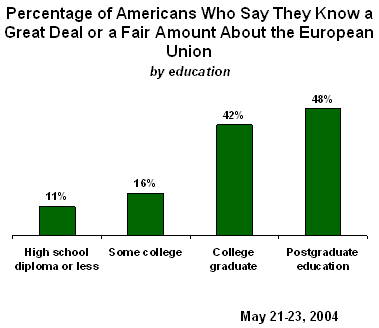GALLUP NEWS SERVICE
PRINCETON, NJ -- By their own admission, Americans are largely uninformed about the network of 25 countries that now comprise the European Union, or EU, as it is widely called. A landmark Gallup Poll testing U.S. public knowledge of the EU finds a remarkably high number -- 77% -- admitting they know very little or nothing about the organization. Only 3% claim to know a great deal about it. Furthermore, relatively few Americans -- just 20% -- correctly assess the population of EU nations relative to that of the United States, saying the EU is "larger."

Although organized in the 1950s as a free-trade organization among a handful of countries (then called the "Common Market"), the EU in its current form was created in 1992. It has rapidly grown to encompass most European countries and has expanded into new areas of cooperation. The EU covers an area only 40% of the size of the United States, but, at about 455 million, its population is over 50% larger than the U.S. population (currently about 295 million), making the EU the world's third-largest political unit after China and India.
All of this "people power" concentrated in largely peaceful and democratic countries holds tremendous economic and political promise for EU member countries. But, consistent with Americans' lack of knowledge about the EU, their assessment of the EU's impact on world affairs is somewhat subdued. The May 21-23 survey of U.S. national adults measured the perceived likelihood that the EU will ever become a superpower such as the United States. Americans are generally dubious; just 44% say this is very or somewhat likely. An equal number, 44%, say it is not very or not at all likely, while an additional 12% are unsure.

The poll also tested public impressions about whether the EU plays a positive or negative role with respect to economic growth, world peace, the war on terrorism, protection of the environment, and the fight against world poverty. Fewer than half of Americans assume that the EU plays a positive role on each of these dimensions. A much smaller number say it plays a negative role, while one-third to one-half are neutral or have no opinion about its role in these matters.
|
Role European Union Plays in World Affairs
|
||||
|
2004 May 21-23 |
Positive |
Negative |
Neither |
No |
|
% |
% |
% |
% |
|
|
Growth of the world economy |
48 |
15 |
24 |
13 |
|
Peace in the world |
45 |
15 |
29 |
11 |
|
The war against terrorism |
41 |
18 |
31 |
10 |
|
Protection of the environment |
40 |
14 |
30 |
16 |
|
The fight against poverty in the world |
33 |
18 |
33 |
16 |
A parallel question asked Americans to assess the U.S. role in the world on these same dimensions, and helps to put the public's views of the EU in some context. In every instance, larger percentages of Americans say the United States plays a positive role than say this for the EU.
|
Role United States Plays in World Affairs
|
||||
|
2004 May 21-23 |
Positive |
Negative |
Neither |
No |
|
% |
% |
% |
% |
|
|
The war against terrorism |
69 |
17 |
12 |
2 |
|
Growth of the world economy |
66 |
17 |
14 |
3 |
|
Peace in the world |
59 |
22 |
18 |
1 |
|
The fight against poverty in the world |
57 |
22 |
20 |
1 |
|
Protection of the environment |
46 |
31 |
21 |
2 |
There are, however, some interesting differences in the way Americans evaluate the United States and the EU on the various dimensions -- differences that may tell as much about the way Americans view their own country as they do about the way Americans view the EU.
The following table summarizes these ratings by showing the "net positive" score (% positive minus % negative) for each objective for both the United States and the EU. On this basis, there is one area in which the EU is rated more positively than the United States: protection of the environment (26% net positive score for the EU vs. 15% net positive score for the United States). The EU also fares relatively well on dealing with world peace. The United States is rated much more positively than the EU is on dealing with the world economy, fighting poverty and, most notably, dealing with terrorism.
|
Net Positive Scores for Handling World
Issues
|
|||
|
European Union |
United States |
Difference |
|
|
(pct. pts.) |
(pct. pts.) |
|
|
|
Protection of the environment |
26 |
15 |
11 |
|
Peace in the world |
30 |
37 |
-7 |
|
Growth of the world economy |
33 |
49 |
-16 |
|
The fight against poverty in the world |
15 |
35 |
-20 |
|
The war against terrorism |
23 |
52 |
-29 |
Knowledge About the EU
As would be expected, self-stated knowledge about the EU is highly related to formal education. The percentage saying they know a great deal or fair amount about the EU rises from 11% among those with no more than a high school diploma to 48% among those with postgraduate education. However, the primary threshold for self-stated knowledge is having a college degree. Still, even among these highly educated Americans, less than half claim to know a great deal or a fair amount about the EU.

Overall, only 2 in 10 Americans correctly say that the EU is larger than the United States, whereas 6 in 10 have an erroneous impression, saying either that the EU is smaller than the United States (29%), or that the two are about the same size (29%). Another 22% have no opinion.
Even those who profess to be fairly knowledgeable about the EU are more likely than not to get it wrong when asked to estimate the population of the EU relative to the U.S. population. Among those saying they know a great deal or fair amount about the EU, only 34% correctly state that the EU's population is larger than that of the United States, while 63% give an incorrect answer. Those who profess to know little or nothing about the EU are even less likely to answer correctly, but, rather than provide a wrong answer, many admit they don't know.
|
Perceptions of EU Population Relative to
U.S. Population
|
|||
|
Know a great deal/fair amount |
Know very little |
Know nothing |
|
|
% |
% |
% |
|
|
EU is larger |
34 |
21 |
12 |
|
EU & U.S. about the same |
30 |
34 |
25 |
|
EU is smaller |
33 |
29 |
26 |
|
No opinion |
3 |
16 |
37 |
Americans who believe they are highly or fairly knowledgeable about the EU are much more likely than those with lower levels of self-stated knowledge to believe the EU is a contender for world superpower status. Nearly two-thirds of those in the high-awareness group (65%) believe it is very or somewhat likely that the EU will one day become a superpower like the United States. This drops to 50% among those who say they know very little about the EU, and to 27% among those who indicate they know nothing about the organization.
|
Likelihood European Union Will Become a
Superpower
|
|||
|
Know a great deal/fair amount |
Know very little |
Know nothing |
|
|
% |
% |
% |
|
|
Likely |
65 |
50 |
27 |
|
Not likely |
35 |
45 |
48 |
|
Unsure |
0 |
5 |
25 |
A similar pattern is seen with respect to perceptions of the role the EU plays internationally. Americans with high levels of self-stated knowledge of the EU are somewhat more likely than those who know very little, and much more likely than those who say they know nothing about the EU, to believe the organization plays a positive role in most areas the survey asked about. In fact, the high-awareness group gives the EU a higher net positive rating with respect to the world economy than Americans, generally, give to the United States (61% vs. 49%).
Survey Methods
These results are based on telephone interviews with a randomly selected national sample of 1,002 adults, aged 18 and older, conducted May 21-23, 2004. For results based on this sample, one can say with 95% confidence that the maximum error attributable to sampling and other random effects is ±3 percentage points. In addition to sampling error, question wording and practical difficulties in conducting surveys can introduce error or bias into the findings of public opinion polls.
27. How much would you say you know about the organization called the European Union or the E.U. -- a great deal, a fair amount, very little, or nothing at all?
|
|
Great |
Fair |
Very |
Nothing |
No |
|
|
|
|
|
|
|
|
2004 May 21-23 |
3% |
19 |
37 |
40 |
1 |
Q.28-29 SPLIT SAMPLED
28. Just your impression, is the combined population of the E.U. member nations larger, smaller, or about the same as the population of the United States?
BASED ON 506 ADULTS IN FORM A
|
|
Larger |
Smaller |
About the same |
No opinion |
|
|
|
|
|
|
|
2004 May 21-23 |
20% |
29 |
29 |
22 |
29. In your opinion, how likely is it that the European Union will become a super power such as the United States -- very likely, somewhat likely, not very likely, or not at all likely?
BASED ON 496 ADULTS IN FORM B
|
|
Very |
Somewhat likely |
Not very likely |
Not at all likely |
No |
|
|
|
|
|
|
|
|
2004 May 21-23 |
13% |
31 |
29 |
15 |
12 |
Q.30-31 SPLIT SAMPLED
30. In your opinion, would you say that the European Union tends to play a positive role, a negative role, or neither a positive nor a negative role regarding -- [RANDOM ORDER]?
BASED ON 506 ADULTS IN FORM A
|
|
|
|
Neither positive nor negative |
|
|
% |
% |
% |
% |
|
|
Growth of the world economy |
48 |
15 |
24 |
13 |
|
Peace in the world |
45 |
15 |
29 |
11 |
|
The war against terrorism |
41 |
18 |
31 |
10 |
|
Protection of the environment |
40 |
14 |
30 |
16 |
|
The fight against poverty in the world |
33 |
18 |
33 |
16 |
31. In your opinion, would you say that the United States tends to play a positive role, a negative role, or neither a positive nor a negative role regarding -- [RANDOM ORDER]?
BASED ON 496 ADULTS IN FORM B
|
|
|
|
Neither positive nor negative |
|
|
% |
% |
% |
% |
|
|
The war against terrorism |
69 |
17 |
12 |
2 |
|
Growth of the world economy |
66 |
17 |
14 |
3 |
|
Peace in the world |
59 |
22 |
18 |
1 |
|
The fight against poverty in the world |
57 |
22 |
20 |
1 |
|
Protection of the environment |
46 |
31 |
21 |
2 |
